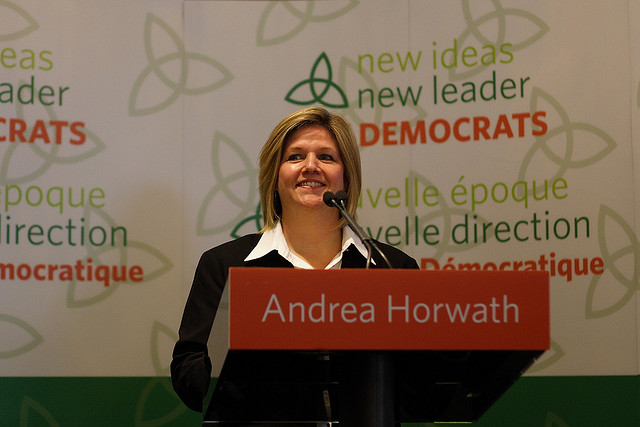Please help rabble.ca stop Harper’s election fraud plan. Become a monthly supporter.
When Andrea Horwath is called a right-wing populist (by me, among others), I’d like to clarify that it’s not the populist part that’s objectionable. Populism is a good starting point. There’s no agreed definition, but in general it builds on a sense among “the people” that they’ve been screwed: by the big shots, the elites, the one per cent — a sense that’s usually justified.
What really matters is: where do you go then? What conclusions do you draw? Do leaders who try to take advantage of this sense of injustice — and there will always be leaders who do — leave people to stew in their resentment, everyone working alone to get a slightly better deal, or do you urge them to pool resources and channel their anger into joint action — government programs, co-ops, unions, whatever.
Right-wing populism rejects the social route. It emphasizes individuals and their private problems. It’s what Rob Ford does: I’ll save you a bit on taxes, punish some of those greedyguts up at city hall.
It also pretty much describes Horwath’s approach: some small hydro rebates, speed up savings on auto insurance, provide some school lunches. Meanwhile, back off solutions that can change people’s lives in a larger way: pension reform, expanded kindergarten, raising the floor on wages for large numbers. Right-wing populism is small ball.
This implies a new definition of right and left. The old left focused economically, on government ownership. This is vaguer. It’s about whether or not to despair of our ability to act consciously together to improve things. Can “we” work it out? If there’s anything left to socialism, it’s the social, not the ism.
Tim Hudak clearly says no to collective action. He’s all about leaving it to big business and market forces. They can work it out. Unleash them to pay less tax, pursue profits and all good things will follow. Horwath’s version, though not obsessed with unleashing corporations, also rejects acting consciously and together to improve our common lot. Three years ago she was for large actions like an Ontario pension plan. Now she’s dropped it, whether because she’s genuinely converted to all small ball all the time or from political opportunism: let’s jump on these Liberals while they’re staggering. The peril in either version is that you leave people in despair, since no “progressive” change can happen without people uniting behind it.
I should add I don’t really think Hudak (and Horwath apparently in his wake) opposes government action per se. But the kind of action he wants has to do with freeing business from publicly imposed responsibilities like regulations or taxes. In fact, it takes a lot of government action to keep government out of the action, as we’ve seen in the last 25 years of free trade deals and tax cutting.
So you get Hudak in this week’s leaders’ debate summation saying, “Hope is on the way,” echoing Groucho Marx’s line in Duck Soup, when the battle was hilariously hopeless and only a joke was appropriate. That’s not a plan, it’s a prayer. Horwath’s version was, “I’ve heard you and I respect you.” It’s also empty and hapless: I won’t do much, but vote for me because I know how angry you are.
Horwath’s NDP kin, Ed Broadbent and Jack Layton, were also opportunists who betrayed their social-democratic “left” principles to win votes. Broadbent with free trade in 1988 and Layton in 2006 by trashing a national child-care program. In both cases it paid off in party terms: they got more seats.
But neither ever rejected the overall commitment to social policies that could improve lives. They were hypocrites, as most people are sometimes, ditching principles for temporary advantage. Horwath, though, has gone the extra step and disavowed the importance of collective political action. In this she’s simply caught up with much of the “left” elsewhere in the world.
It’s weird that the historically wishy-washy, principle-free Liberal party is left holding the bag of belief in an ability to act together to address injustice and make things better. But that’s how history sometimes breaks. Maybe it’s what Marx meant (Karl, not Groucho), quoting Hamlet: that the old mole keeps burrowing away underground, then surfaces in the most unexpected places.
This column was first published in the Toronto Star.
Photo: Michelle Tribe/flickr



